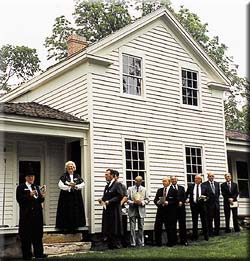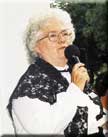Breaking News
Historic Adventist Village Opens
BY JAMIE ARNALL, who writes from Battle Creek, Michigan
"Ladies and Gentleman, this is a day we should never forget; the spirit of Battle Creek is still alive!" proclaimed Neal Wilson, former president of the General Conference of Seventh-day Adventists. His was but one of the many positive sentiments expressed during the opening ceremonies of Historic Adventist Village in Battle Creek, Michigan on June 24, 2000.
 An estimated 1,500 people from many countries and several states attended the historic occasion as the church's heritage was highlighted in this new nurture and evangelistic endeavor. An official ribbon cutting ceremony followed remarks by state, civic, and church officials.
An estimated 1,500 people from many countries and several states attended the historic occasion as the church's heritage was highlighted in this new nurture and evangelistic endeavor. An official ribbon cutting ceremony followed remarks by state, civic, and church officials.
Excited guests eagerly toured the Village. Walking from site to site, visitors were able to learn about the dedication and zeal animating many of the early church pioneers.
"It's going to be educational for the community people and the average citizen, but it's also going to be faith-affirming for our own people," said Jere Patzer, president of the North Pacific Union Conference, after touring the Village.
Oakwood College president Delbert Baker expressed his conviction that all Adventist colleges in North America should arrange for their students to visit the Village. Visitors to the one-room schoolhouse heard the story of the first official Adventist church school from volunteer guides.
In the James and Ellen White house, visitors were able to tour the upstairs bedroom where in 1858 Ellen White wrote the first edition of The Great Controversy.
 Historic Adventist Village leaders believe that stories, which focus on the mission and message of the Adventist pioneers provide an ideal way to share the beliefs that are still held by Seventh-day Adventists. "It's exciting to see how Historic Adventist Village emphasizes Jesus Christ and how He has led His people through the years. I think it's really wonderful," adds Paul Kemper, a retired pastor from Napa Valley, California.
Historic Adventist Village leaders believe that stories, which focus on the mission and message of the Adventist pioneers provide an ideal way to share the beliefs that are still held by Seventh-day Adventists. "It's exciting to see how Historic Adventist Village emphasizes Jesus Christ and how He has led His people through the years. I think it's really wonderful," adds Paul Kemper, a retired pastor from Napa Valley, California.
Adventists around the world are giving new attention to the church's rich history. Swedish Union president Per Bolling, sums it up well: "We must know what kind of roots we have if we are going to remain true to what we are as a church."
Women in the Pulpit Issue
Regular worship activities were halted when members of the congregation and church leadership wrangled over women preaching in the pulpit at the Bangwe Seventh-day Adventist Church, 15 kilometers from the center of Blantyre, Malawi's capital.
Worship services were disrupted when Mrs. P.A. Neniwa, women's ministries director for the region, was not allowed to address the congregation. "There is no scripture in the Bible that authorizes women to preach," stated one church elder. According to reports from the Malawi Adventist Church, subsequent meetings with the local congregation "degenerated into rivalry between the pastor and the members," and the church administrators initially suspended services for two weeks. The incident received media attention in the country and throughout Africa.
In an uncompromising move, the Bangwe and Nimiyango church congregations, which together with other smaller companies in the area number approximately 1,000 members, separated from the denomination.
"The uncompromising members are still meeting in the church that was closed," states Ken Bilima, communication director for the Malawi Seventh-day Adventist Church.
"They broke into the [Bangwe] church and removed the old locks and put in six new locks." Bilima says that the Bangwe and Nimiyango assets remain the property of the denomination.
A smaller, 200-member congregation, which supported a greater involvement of women in the ministry of the church, is worshiping at a local government school located near the Bangwe church.
In an official statement, the Malawi Union of Seventh-day Adventists announced "the disbandment of Bangwe and Nimiyango Seventh-day Adventist Churches," stating that all efforts to redeem and reconcile the churches failed, that the two churches have continued to bar women from participating in the church ministry, and that the churches introduced teaching which "openly rebelled against the Seventh-day Adventist Church."
"The Church's position regarding the matter of women preaching from the pulpit is clear," says Pardon Mwansa, president of the Eastern Africa Division (EAD) of the Church with headquarters in Harare, Zimbabwe.
"Women are as free to share the gospel from the pulpit as are their male counterparts," he added. The Malawi Adventist Church is part of the EAD territory.
Although not referencing any details of the situation, Mwansa said "the church does not condone violence as a means to handle differences. A more appealing approach is that of talking matters over as brothers and sisters." �-Adventist News Network
Sabbath Roots Conference Convenes in November
Those interested in studying the origin of Sabbath worship in Africa are invited you'll want to attend "Sabbath Roots--The African Connection," a conference convening November 8-9 at the Davison Center at the University of Southern California in Los Angeles.
Sponsored by the Southeastern and Southern California conferences, and Hands Up CA, the Sabbath Roots conference will present a unique study of how the human family relates to God, each other, and the concept of Sabbath rest. The conference speakers include Charles E. Bradford, former president of the Seventh-day Adventist Church in North America and author of Sabbath Roots�-The African Connection, and Garner C. Taylor, pastor-emeritus of Concord Baptist Church in New York.
For more information, and to register, call Hands Up CA at (909) 358-1225, or e-mail [email protected].
News Notes
Dowell W. Chow, New Jersey Conference president, was recently elected Columbia Union Conference treasurer. Chow replaces Dale Beaulieu who became a vice president of Adventist World Radio.
Benjamin D. Schoun, Northern New England Conference president, was recently elected president of the Atlantic Union Conference. Schoun replaces Theodore Jones who became an associate secretary of the General Conference.
Reo Ganson, president of British Columbia Conference in Canada, was recently elected president of Canadian University College (CUC)College Heights, Alberta. Ganson replaces Randal R. Wisbey who became Columbia Union College president. Ganson had previously served as CUC president from 1987-1991.
Charles W. Scriven, Columbia Union College president, was recently appointed interim president of the Kettering College of Medical Arts in Kettering, Ohio. Scriven replaces Peter D. H. Bath who became pastor of the Sligo Seventh-day Adventist Church in Takoma Park, Maryland.


